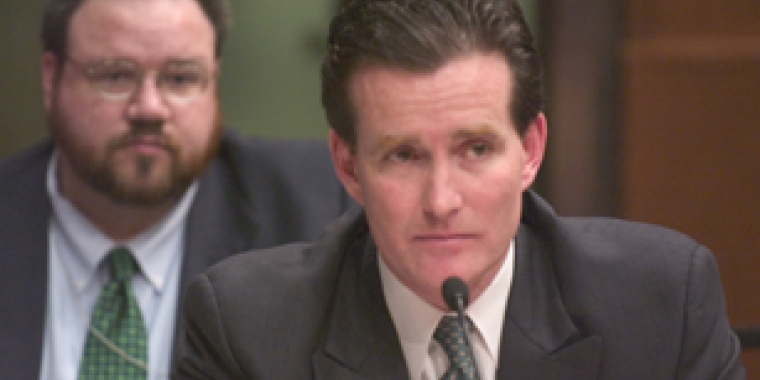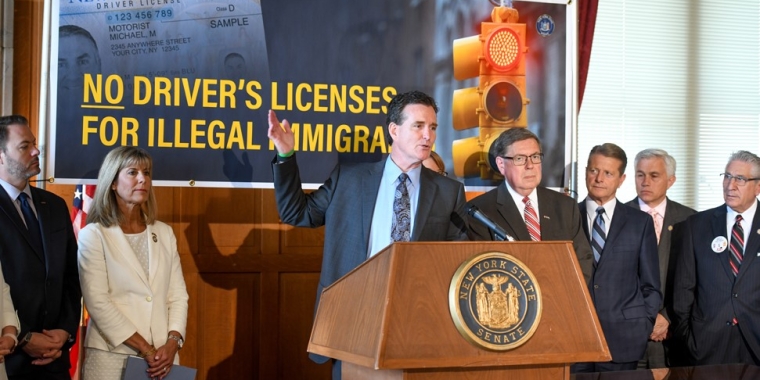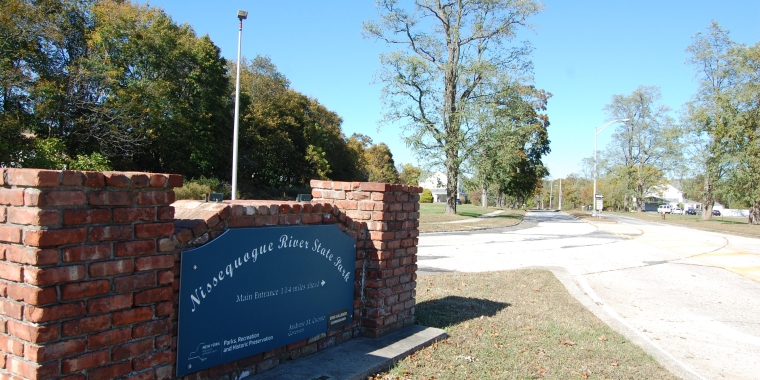
Senate Passes Package Of Hava Legislation

The New York State Senate passed a package of legislation today that allows New York State to meet federal election standards by bringing the New York State election law into compliance with the federal Help America Vote Act (HAVA). HAVA is designed to improve and enhance voter access, prevent fraud, and modernize elections across the nation.
"The agreements reached in the joint conference committee represent the first major overhaul of New York State’s election process in over 50 years," said Senator John Flanagan (R-C, East Northport), Chair of the Senate Elections Committee. "The passage of this legislation is an important step for New York in meeting the federal mandates and ensuring appropriate reform in our election process."
"I applaud Senator Flanagan and all of the members of the HAVA conference committee for their hard work on this legislation," said Senate Majority Leader Joseph L. Bruno. "Democracy in this great state of ours is based on the active participation of our citizens throughout the state and democracy is at its best when people exercise their right to vote. These bills will encourage participation in the election process and will ensure the integrity of our elections process in New York State."
"This legislation will protect the integrity of our election process, ensure that every vote counts, safeguard against fraud and meets the requirements of special needs voters," Senator Flanagan said. "Fair, honest and verifiable elections are essential, and these bills will ensure that the millions of New Yorkers who go to the polls on Election Day will have a better election experience and the 77,000 election workers will be able to deliver better elections."
Conceived in the wake of the controversial 2000 presidential election in Florida, HAVA represents the most significant reform of federal election law since the Voting Rights Act of 1965. President Bush signed HAVA into law Oct. 29, 2002. The federal legislation creates many new mandates for state and local governments and provides a total of $3.9 billion in possible federal funding for all states. To date, New York State has received nearly $220 million in grant funds under the federal law. Approximately $190 million of the grant funds are earmarked for the replacement of outdated voting equipment.
Election Reform Modernization Act (S.5877, Senator Flanagan)
The federal Help America Vote Act provides funding for states to upgrade and modernize their voting machines. This bill will allow New York to replace voting machines with modern computerized voting systems.
"Upgrading New York’s voting system is essential to our overall goal of modernizing elections," said Senator Flanagan. "This bill will provide standards for those new machines and structure for implementing HAVA so that New Yorkers can vote effectively and securely."
A "voting system" in New York will be comprised of a device capable of notifying the voter if corrections are necessary on his or her ballot (known as second-chance voting), allows persons with disabilities, and others, the opportunity to vote unassisted, and provides for a voter-verified paper receipt to be part of all new voting machines.
The State Board of Elections will be required to adopt HAVA-compliant voting machine standards laid out in the legislation. The Modernization Advisory committee will advise the SBOE on which machines meet the standards. Once the SBOE certifies that a machine meets the standards it is eligible to be purchased by a county. The SBOE will act as the purchasing agent and direct the State Comptroller to release HAVA funds to vendors who in turn deliver the machines to the county. This process will ensure bulk purchase savings and that manufacturers provide counties with educational and technical support.
Under the bill, voting machine manufacturers will be required to place vital source code and other information in escrow with the SBOE to prevent fraud and tampering.
In addition, the legislation also provides for training and education of local BOE employees and the public on the new machines, provides for a random 3 percent audit of all voting machines after an election.
Poll Site Accessibility (S.5871, Senator Flanagan)
Effective July 1, 2006, all poll sites will have to be accessible to the disabled in accord with ADA guidelines and HAVA. This legislation would create the Help America Vote Act Accessibility Fund to assist local boards of elections with making improvements to polling places so that the buildings are in compliance with the requirements of the Americans with Disabilities Act as it pertains to polling places.
"This legislation will make it easier for people with disabilities to enter polling places and vote independently on new voting equipment," said Senator Flanagan. "By mandating that all polling sites comply with these accessibility guidelines, this legislation will help ensure that all people with disabilities can be accommodated in a fair and equitable fashion at all polling sites."
Voter Verification (S.5819, Senator Flanagan)
Under the Help America Vote Act (HAVA), states must, among other things, require all voters to provide their driver’s license number, or the last four digits of their social security number when registering to vote. In the event they have neither of the above, a unique number will be assigned to them by a BOE before their application can be processed and accepted. HAVA also requires first-time voters who registered by mail to produce evidence of their identity before voting.
The State Board of Elections will establish a database with the Department of Motor Vehicles and the Social Security Administration to verify the information provided. The information has to be verified against the state databases or else the voter cannot vote on a machine.
Following the registration process the voter is sent one of three cards: Application Approved, Application Approved But We Need More Information To Verify Your Identity, Application Rejected. The Card requiring more information will state that the voter may not be able to vote on a voting machine on election day without further identification. If the voter has not responded, a second card is sent out after 45 days reminding him the local board of election needs further information.
Poll books will notate that a voter is unverified and can’t vote on a machine unless he provides the proper ID. The voter can present HAVA ID (Valid photo ID, current utility bill, bank statement, government check, paycheck or other government document) at the poll and be verified.
All voters are allowed to vote using provisional (affidavit) ballots if they forget ID or are not listed in poll books. Once election officials successfully verify an individual’s identity and/or voter registration, his or her ballot would be counted. Provisional voting helps to ensure that no voter is turned away at the polls.
County Consolidation of Elections (S.5822, Senator Flanagan)
County Boards of Election will consolidate election functions, own machines and all equipment and appliances related to the conduct of elections and be required to conduct at least one annual mandatory training session for poll workers with an exam.
"The County takeover of election responsibilities will provide uniformity and consistency in election administration throughout the state," Senator Flanagan said. "This legislation will provide better accountability, standardization and efficiency as we attempt to replace over 20,000 machines, equip over 7,500 poll sites, and train nearly 78,000 poll workers."
If the county boards cannot agree on providing necessary voting machines the state board may step in and execute a contract for the purchase of necessary voting machines and charge the county for the expense.
Poll inspectors will be paid for their election duties by the county at a rate approved by the county legislature. The inspectors will be paid $25 for any training session plus a County Legislature approved option to pay for mileage.
The county at its option may charge back against the towns, villages and cities for the cost incurred on conducting elections.
First Time Voter by Mail ID (S.5820, Senator Flanagan)
HAVA requires first time voters/registrants who registered by mail without providing proper proof of their identity to show one of four forms of ID at their polling place before they can vote: a "valid photo ID," a "utility bill," a "bank statement" or "other government document." If the person doesn’t provide ID at the polling place they can still vote by affidavit ballot.
A bill was chaptered last year that met HAVA’s ID requirements and was effectively administered by all the local BOEs throughout the State. The provisions of that bill have been made permanent.
Governance at SBOE (S.5821, Senator Tom Morahan, R-C-I-WF, New City)
This Senate will act later today on a bill maintains bipartisanship at the SBOE by creating two Co-chairs on the board of SBOE commissioners. Further amendments create SBOE Co-executive directors; with salaries set by the SBOE, with four-year terms, and with commissioners of the same party as Co-executive director filling any vacancy. If a vacancy occurs with a commissioner appointed by the legislative leaders of a major political party and the governor does not act on the appointment with 30 days those legislative leaders can either make the appointment themselves or recommend another name to the governor.
"I am delighted to see this legislation on the way to become law," said Senator Morahan. "This bill allows for a level of trust so important to provide and orderly governance of elections across the state."
The bills passed by the Senate were sent to the Assembly.
Earlier in the Legislative Session two bills were chaptered that for the first time ever created a Statewide Voter Registration List and a voter grievance process.
Statewide Administrative Complaint Procedure (Senator Flanagan, Chapter 23 of 2005)
This law sets up a HAVA mandated complaint procedure to be administered and decided by the SBOE and requires SBOE to decide a complaint within 90 days or the matter gets sent to
an alternative dispute resolution process, governed by SBOE rules and regulations to ensure uniformity. This bill (coupled with providing five percent of the federal funds in state matching funds) enabled New York to access approximately $153 million in second round federal HAVA funding.
Statewide Voter Database (Senator Flanagan, Chapter 24 of 2005)
The establishment of a statewide voter registration system in New York will help prevent voter fraud. It will tie the election’s office of each of New York’s 62 counties into one centralized system that will be supervised by the State Board of Election. Each registered voter’s pertinent information will be input into the county’s system and then forwarded in "real time" to the State Board of Election. This will allow local election officials to cross reference a voter’s identification to make sure he or she is not already registered in another county. The system will be in place and operational by January 1, 2006.
The system will also alert an election official if the address listed by a potential voter has been used by one or more previously registered voters, thereby alerting officials to possible voter fraud.



